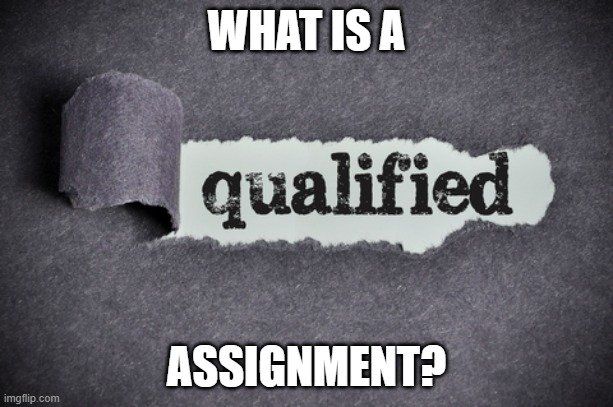(888)-325-8640
Call a settlement expert now, what is a qualified assignment, why most insurers won't structure without one.


What is a qualified assignment with a structured settlement?
A qualified assignment enables a Defendant, Insurer, or Qualified Settlement Fund, to achieve a complete novation of the future periodic payment claim when a structured settlement is established, through a substitution of obligors. This is important to Defendants, or Insurers because the total payments from a structured settlement will exceed the cost of the structured settlement. A structured settlement is a useful settlement tool for all parties, but without a qualified assignment the Defendant or insurer has contingent liability in the event of insolvency of the annuity issuer that could exceed the settlement funding amount.
A qualified assignment is a transfer of a contractual obligation to make future periodic payments, which satisfies the requirements of Internal Revenue Code (IRC) §130. In a structured settlement agreement, the original obligor (the defendant, insurance carrier for the defendant, or the trustee of an IRC 468B qualified settlement fund), assigns its obligation to make the future periodic payments defined in the settlement agreement to a "qualified assignment company".
Today it is very rare that a structured settlement is established as part in a personal injury, wrongful death or workers compensation settlement without a qualified assignment.
Only payments which represent damages for personal injury, physical sickness, wrongful death and payments for workers compensation may be assigned via a qualified assignmen t.
Qualified Assignment in the Internal Revenue Code
According to IRC 130(c) , the term " qualified assignment " means any assignment of a liability to make periodic payments as damages (whether by suit or agreement), or as compensation under any workmen’s compensation on account of personal injury or sickness (in a case involving physical injury or physical sickness)—
(1) if the assignee assumes such liability from a person who is a party to the suit or agreement, or the workmen’s compensation claim, and
(2) if —
(A) such periodic payments are fixed and determinable as to amount and time of payment ,
(B) such periodic payments cannot be accelerated, deferred, increased, or decreased by the recipient of such payments,
(C) the assignee’s obligation on account of the personal injuries or sickness is no greater than the obligation of the person who assigned the liability, and
(D) such periodic payments are excludable from the gross income of the recipient under paragraph (1) or (2) of section 104(a).
The determination for purposes of this chapter of when the recipient is treated as having received any payment with respect to which there has been a qualified assignment shall be made without regard to any provision of such assignment which grants the recipient rights as a creditor greater than those of a general creditor.
(d) Qualified funding asset
For purposes of this section, the term “ qualified funding asset ” means any annuity contract issued by a company licensed to do business as an insurance company under the laws of any State, or any obligation of the United States, if—
(1) such annuity contract or obligation is used by the assignee to fund periodic payments under any qualified assignment ,
(2) the periods of the payments under the annuity contract or obligation are reasonably related to the periodic payments under the qualified assignment , and the amount of any such payment under the contract or obligation does not exceed the periodic payment to which it relates,
(3) such annuity contract or obligation is designated by the taxpayer (in such manner as the Secretary shall by regulations prescribe) as being taken into account under this section with respect to such qualified assignment , and
(4) such annuity contract or obligation is purchased by the taxpayer not more than 60 days before the date of the qualified assignment and not later than 60 days after the date of such assignment.
Does " fixed and determinable" mean that payments are fixed at a certain amount and cannot change?
The IRS has concluded in several Private Letter Rulings over two decades, obtained by structured settlement annuity issuers in support of product innovation, that fixed and determinable could be based on an objective formula
In IRS PLR-202127039 (published July 9, 2021) in response to a request from American General Life Insurance Company in support of its Interest Linked Structured Settlement Annuity, the IRS ruled:
- The periodic Subject Payments of damages that Minor will receive are fixed and determinable as to amount and time of payment within the meaning of § 130(c)(2)(A) even though they are calculated pursuant to an objective formula based on the performance of 10-year United States Treasury Bond Yield Rate. In addition, the other requirements of § 130(c) have also been met. Accordingly, the assignment entered into pursuant to the Assignment Agreement is a qualified assignment under § 130(c).
2. The Annuity purchased by the Assignee qualifies as a qualified funding asset under § 130(d).
In IRS PLR 201435006 (published on August 29, 2014) in response to a request by Pacific Life to support its Index Linked Annuity Payment Adjustment Rider (ILAPA), the IRS ruled that:
1. The periodic payments of damages that Claimant will receive are fixed and determinable as to amount and time of payment within the meaning of § 130(c)(2)(A) even though they are calculated pursuant to an objective formula based on the performance of the S&P 500 Index.
2. The Structured Settlement Indexed Annuity which Assignee will acquire from either Issuer 1 or Issuer 2 will not fail to qualify as a qualified funding asset under § 130(d) solely by reason of annuity’s variable payments.
3. The possibility of a commutation by Claimant pursuant to the Notice of Hardship Conversion will not affect whether the structured settlement assignment satisfies the requirements of a qualified assignment under § 130(c).
4. The annuity purchased by Assignee will not fail to be a qualified funding asset under § 130(d) by reason of the Notice of Hardship Conversion.
In PLR 199943002 (1999), obtained by MetLife to support a variable annuity structured settlement product it was introducing, the IRS concluded:
I1. The periodic payments of damages that Claimant will receive are fixed and determinable as to amount and time of payment under § 130(c)(2)(A) even though they are calculated pursuant to an objective formula based on the performance of the Standard & Poor’s 500 Stock Index and/or a mutual fund portfolio designed to achieve long-term growth of capital and moderate current income;
2. The annuity Assignee will acquire from Issuer will not fail to qualify as a qualified funding asset under § 130(d) solely by reason of the annuity’s variable payments, which are reasonably related to the periodic payments under the qualified assignment; and 3. Claimant’s physical possession of the annuity solely to perfect, under applicable state law, a security interest in the annuity used to fund the periodic payments will not cause Claimant to receive income in the year Claimant takes possession of the annuity contract if the defendant's assignment to Assignee is a qualified assignment under § 130(c).
What is a qualified assignment company?
Generally, a qualified assignment company is a special purpose company, which does little more than hold structured settlement annuities or United States Treasury obligations as a "qualified funding asset" to back up the periodic payment obligations it assumes from Defendants, Insurers or qualified settlement fund administrators/trustees. A qualified assignment company may actually be an insurance company itself, but most qualified assignment companies are not insurance companies. When an annuity is used as a qualified funding asset, the qualified assignment company is usually related to the life insurance company issuing the structured settlement annuity. In such cases, the qualified assignment company typically purchases an annuity from the related life insurance company as a qualified funding asset pursuant to IRC 130(d).
Types of Qualified Assignment Agreements
1. Qualified Assignment (QA)
A legal instrument executed by Defendant, Insurer or Qualified Settlement Fund Trustee and Qualified Assignment Company
Also referred to as a two-party qualified assignment.
2. Qualified Assignment and Release (QAR)
A legal instrument executed by Defendant, Insurer or Qualified Settlement Fund Trustee, Qualified Assignment Company and Releasing Party. Also referred to as a three-party qualified assignment
3. Qualified Assignment Release and Pledge (QARP)
A legal instrument executed by Defendant, Insurer or Qualified Settlement Fund Trustee, Qualified Assignment Company and the Claimant-Secured Party. Used where there is a desire to give the payee a security interest in the annuity contract.
Which Qualified Assignment Agreement to Use?
While the QA works, it is no longer the standard of practice. While it affects the plaintiff, the QA's two-party process is not inclusive of the plaintiff. It is between the insurer and the assignment company. With the next two options, the QAR and QARP a plaintiff signature and review is required.
Important Note
Where the Claimant-Secured Party is different than the Releasing Party an additional signature on the QARP may be required.
For example, a minor plaintiff who will be adult when payments are made but is represented by a parent or guardian at the time of settlement. Another example could be where the payee is a Special Needs Trust (Supplemental Needs Trust, in New York), and the trust is the secured party, but the plaintiff is releasing the claim
The following video about structured settlement documentation may be helpful to those who wish to learn more. We also encourage readers to call is at 888-325-8640. Last updated November 9, 2023
< Older Post
Newer Post >

What is Risk Adjusted Capital Ratio (RACR)?

What is Risk Based Capital?

What is A Certified Financial Transitionist? (CeFT)

What is Sequencing Risk? Can Structured Settlements Help?

What is a Structured Settlement Lock-in?

Market Based Structured Settlements | How They Work

New York City Structured Settlement Annuities 2024

NY CPLR 50A/50B | Rising Yields 2022-2024 Squeezed 15 Year Plaintiff Advantage

Construction Defect Structured Settlements

Structured Settlement Beneficiary Death Claim | What You Need to Know 2024
Contact Us | Top Listed Structured Settlement Annuity Companies | Ethics | Structured Settlement Watchdog Blog | FAQ | Glossary | Privacy | Terms and Conditions
4structures.com, LLC
The Structured Settlements and Settlement Planning Company
43 Harbor Drive, #309 Stamford, CT 06902 USA
888-325-8640
646-849-1588
New York City (Manhattan, Bronx, Brooklyn, Queens, Staten Island), Westchester(NY), Nassau County (NY) , Suffolk County on Long Island (NY), Albany County (NY), Oswego County (NY), Steuben County (NY), Broome County (NY), Onondaga County (NY), Monroe County (NY), Fairfield County (CT), New Haven County (CT), Hartford County (CT) New London County (CT), Tolland County (CT), Litchfield (CT), Middlesex (CT) , Bergen County (NJ), Middlesex County (NJ), Ocean County (NJ)
Structured Settlement Experts and Settlement Planning Consultants for settlements from claims or lawsuits arising out of Aviation accidents, Medical Malpractice, settlements involving Serious Personal Injury, Wrongful Death, Wrongful Incarceration, Employment, Civil Rights, Discrimination of any type, Auto accidents, Motorcycle accidents, Maritime accidents, Workers' Compensation, Product Liability, Real Estate Liability, Construction Defect claims or lawsuits, Landlord/Tenant,
Property, Attorney Fee Deferrals, Funding Agreements, Structured Installment Sales, Environmental Liability and Commercial Dispute settlements.
Structured settlements and structured settlement brokerage, settlement planning, Sudden Money®, financial transitionist, funding agreements and insurance related services provided by 4structures.com LLC.
Financial Advisory Services provided through Groove Financial Advisors , LLC, and its service partners.
Fiduciary services, including the custody and administration of trusts provided via service partners.
Securities and Insurance Products are NOT Insured by the FDIC, nor by any other Federal or State Government Agency, are NOT a Deposit of and are NOT Guaranteed by a Bank or any Bank Affiliate, and securities MAY lose value.
4structures (USPTO Reg. 4640532) , 4structures.com (USPTO Reg. 4640531) , We Know Structured Settlements (USPTO Reg. 3089738),
Because Certain Sells (USPTO Reg. 6237309) and We Know Structured Sales (USPTO Reg. 3490489), are Registered Trademarks of 4structures.com LLC.
John Darer is a Registered Trademark of John Darer (USPTO Reg. 4674907)
John Darer California insurance license 0761076
4structures.com LLC CA license OF19785 d/b/a 4structures Settlement Insurance Agency

Copyright ©2024 4structures.com LLC
All rights reserved.


The Top 5 Reasons to Consider a Structured Settlement
Lump sum vs. structured settlement: what’s the better choice, qualified vs. non-qualified assignments: what do they mean for settlement proceeds.

Structured Annuities: How They Work
If a claimant decides to utilize a structured settlement, the defendant (or insurance company) “assigns” its obligation to pay to a third-party assignment company. The assignment company then uses the settlement proceeds to purchase a structured settlement annuity that provides regular payments to the claimant based on a schedule previously chosen by the claimant.
When an attorney chooses a fixed annuity as the financial vehicle for their attorney fee deferral , the process is essentially the same: the defendant or insurance company directs the fees to an assignment company, which then uses the funds to purchase an annuity. The attorney receives the annuity payments on a pre-determined schedule.
Qualified Assignments
A “qualified assignment” simply means one that qualifies for income tax exclusion based on the criteria defined in Internal Revenue Code §§104(a)(2) and 130. Settlement proceeds from personal injury, wrongful death, and workers’ compensation cases all fall under this designation. Not only are the settlement proceeds income-tax free, but if placed in a structured settlement annuity, the growth on the proceeds is also income tax-free.
Non-Qualified Assignments
A “non-qualified” assignment is—you guessed it—one that does not qualify for income tax exclusion. However, certain types of non-injury settlements do still have the option for tax-favored treatment . If placed in a structured annuity, taxes are only due on the proceeds as they are received. Rather than getting hit with a large tax bill for a cash lump sum payment, the tax obligation can be spread out over time.
A non-qualified assignment can be used for attorney fee deferrals and for a multitude of legal settlements, including: age discrimination, Americans with Disabilities Act, athletes’ endorsement fees, celebrity endorsement fees, construction defects, divestment, divorce settlements, environmental settlements, legal fee disputes, legal malpractice/professional errors and omissions, race discrimination, sexual harassment, structured sales, and wrongful termination.
Contact Traci Kaas to learn more about your options
To learn more about financial options for injury and non-injury settlements, contact the experienced team at Traci Kaas today. We can be reached at [email protected] or 800-354-2258.
Related posts
How to reap long-term financial benefits in a taxable damages case: the latest options for settlements outside of the realm of physical injury, physical sickness, or wrongful death, vote for tsaw as california’s #1 structured settlement provider.
What’s the Difference Between Qualified vs. Non-Qualified Settlements?

What is the difference between a “ qualified ” structured settlement and a “ non-qualified ” structured settlement?
When describing a structured settlement, the terms “ qualified ” and “ non-qualified ” generally refer to “ assignments ” and IRC Section 130. The primary tax difference, from a structured settlement recipient’s perspective, is that “ qualified ” structured settlement periodic payments are excluded from income tax whereas “ non-qualified ” structured settlement periodic payments are deferred until actually received.
The term “ qualified assignment ” is defined for tax purposes by IRC Section 130. “ Qualified assignment ” means that a defendant or its liability insurer first gives the claimant a promise to pay structured settlement periodic payments in the future; next transfers that obligation to a substituted obligor pursuant to IRC Section 130; and thereby extinguishes its contractual liability for the obligation it transferred.
IRC Section 130 provides that any amount received by an assignee for assuming a periodic payment obligation may be excluded from the assignee’s gross income so long as seven requirements are satisfied:
- The tort claim involves personal physical injury or physical sickness;
- The periodic payments are excludable by the recipient under IRC Section 104(a)(2);
- The assignor is a party to the suit or agreement which gives rise to the obligation;
- The periodic payments are fixed and determinable as to amount and time of payment;
- The periodic payments cannot be accelerated, deferred, increased or decreased by the recipient of the payments;
- The assignee’s periodic payment obligation is no greater than that of the assignor; and
- The assignee purchases qualified funding assets (either annuities or U.S. Government obligations) to fund the periodic payment obligations.
Although IRC Section 130 does establish any restrictions on what types of companies or legal entities may serve as assignees, most qualified assignments are funded with life insurance annuities and the assignees are almost always affiliates of the life insurance companies that issue those annuities. For example, Independent Assignment Company serves as the assignment company for all of Independent Life’s qualified structured settlement assignments.
Qualified Assignments can also be made out of an IRC Section 468B Qualified Settlement Fund (QSF) and can be utilized to fund structured attorney fees for tort cases that involve personal physical injury or physical sickness – whether or not the claimant decides to structure his or her settlement.
Not all settlements involve tort claims, however, and not all tort claims involve “ physical personal injury or physical sickness ” – which is one of the requirements of IRC Section 130.
A “ non-qualified assignment ” represents the transfer of a structured settlement periodic payment obligation that does not qualify under Section 130 of the Internal Revenue Code. This means the assignee is subject to applicable taxation on the amount it receives from the defendant or liability insurer that assigns the structured settlement periodic payment obligation when it receives money to purchase the annuity(s) to fund the obligation to the claimant.
“ Non-qualified assignments ” therefore allow litigating parties the ability to settle a claim and to fund a periodic payment obligation using a “ Section 130-like ” transfer when neither the claim being settled nor the agreed periodic payments qualify for treatment under IRC 104(a)(1) or Section 104(a)(2). Unlike “ qualified ” structured settlement cases, however, the income taxation on these “ non-qualified ” structured settlement periodic payments are deferred rather than excluded.
There are many types of cases that may be resolved through non-qualified structured settlements such as:
- Employment disputes
- Wrongful termination
- Psychological/emotional harassment
- Sexual harassment
- Attorney fees
- Wrongful incarceration
- Punitive damages
An assignee of a non-qualified assignment based in the United States will be subject to corporate income tax on any funds paid to it in exchange for assuming assignee obligations. For this reason, companies offering “ non-qualified ” assignments typically utilize non-domestic assignment companies.
Independent Life is one of the few structured settlement annuity providers that offers both “ qualified ” and “ non-qualified ” structured settlements. For “ non-qualified ” cases, we leverage the strength and market recognition of two non-domestic assignment companies, Structured Assignments (SAI) of Barbados and Kenmare Assignment Company Limited (Kenmare) of Ireland. By utilizing an offshore assignment company, Independent Life can offer fully customizable payout patterns of fixed and guaranteed payments to settlement planners and their claimants including deferred, lump sum, fixed period or lifetime payments.
Turbocharge your firm with our free resources
Subscribe to our newsletter.

Deep expertise combined with unparalleled access. Market-leading underwriting and pricing, plus turnaround times that redefine industry benchmarks. Innovative solutions that challenge convention. Impressive credentials plus best-in-class partners to back it all up.
- Testimonials
- Qualified Settlements
- Non-Qualified Settlements
- Attorney Fee Structures
- Payee Protection Policy
- iStructure Annuity
P.O. Box 679053 Dallas, Texas 75267-9053
Any discussion of taxes herein is for general informational purposes only and does not purport to be complete or cover every situation. Independent Life, its affiliates, its distributors, and its and their respective representatives do not provide tax, accounting, or legal advice. You should confer with your qualified legal, tax and accounting advisors based on your particular circumstances. All guarantees are obligations of Independent Life Insurance Company.

Questions? Call Us at 713-621-2027
After a settlement is reached and reduced to writing in a settlement agreement, the defendant can “assign” its obligation to pay any future payments to the plaintiff. This assignment is made to an entity called an assignment company to meet its obligations.
During the assignment process, the defendant must transfer the applicable settlement monies to the assignment company, after which both parties must sign a Uniform Qualified Assignment contract.
Understanding Qualified Assignments
An assignment is considered a “qualified assignment” if the settlement proceeds are excluded from income taxes under IRC §104a(2). To be excluded, the proceeds must be for compensatory damages from a case involving physical injury or illness.
IRC§130(c) states that payments can be made in the form of future periodic payments as long as:
- Cash flows are fixed and determinable
- Cash flows cannot be accelerated, deferred, increased, or decreased
Upon assignment of the obligation from the defendant to the assignment company, the defendant is released from further liability and administrative duties.
The Benefits of Qualified Assignments
From the plaintiff’s perspective, an assignment to a financially secure insurance company gives them the assurance that future payments will be made as promised . For many plaintiffs, this assignment to the life company alleviates the stress of future contact with the defendant, their insurer, or any party responsible for the injury.
From the defendant and/or their insurer, an assignment relieves the defendant of further compensation and responsibility. The defendant and/or their insurer are able to write just one check to the assignment company for the defendant’s liability, take the corresponding tax deduction, and transfer administrative duties and payment responsibilities to a third party (the life company and their assignee).
Learn more by contacting ROBINYOUNG & COMPANY.
Award Winning Structured Settlement Services

qualified assignment
26 USC § 130(c)
Scoping language
404 Not found
We use cookies.
A cookie is a piece of data stored by your browser or device that helps websites like this one recognize return visitors. We use cookies to give you the best experience. Some cookies are also necessary for the technical operation of our website. If you continue browsing, you agree to this site’s use of cookies.
Privacy Policy: Our Policies regarding the Collection of Information
- Subchapter B
Sec. 130. Certain Personal Injury Liability Assignments
More information, 24 / 7 help desk.
- 1-833-697-9559
- [email protected]
- Terms & Conditions
- Privacy Policy
- Bloomberg.com
- Accessibility
- Search Search Please fill out this field.
- Government & Policy
Assignee: What it is, How it Works, Types
:max_bytes(150000):strip_icc():format(webp)/wk_headshot_aug_2018_02__william_kenton-5bfc261446e0fb005118afc9.jpg)
Michelle P. Scott is a New York attorney with extensive experience in tax, corporate, financial, and nonprofit law, and public policy. As General Counsel, private practitioner, and Congressional counsel, she has advised financial institutions, businesses, charities, individuals, and public officials, and written and lectured extensively.
:max_bytes(150000):strip_icc():format(webp)/MichellePScott-9-30-2020.resized-ef960b87116444b7b3cdf25267a4b230.jpg)
Ariel Courage is an experienced editor, researcher, and former fact-checker. She has performed editing and fact-checking work for several leading finance publications, including The Motley Fool and Passport to Wall Street.
:max_bytes(150000):strip_icc():format(webp)/ArielCourage-50e270c152b046738d83fb7355117d67.jpg)
What Is an Assignee?
An assignee is a person, company, or entity who receives the transfer of property, title, or rights from another according to the terms of a contract. The assignee receives the transfer from the assignor. For example, an assignee may receive the title to a piece of real estate from an assignor.
Key Takeaways
- An assignee is a person, company, or entity who receives the transfer of property, title, or rights from a contract.
- The assignee receives the transfer from the assignor.
- An assignee may be the recipient of an assignment, a liability, or appointed to act in the stead of another person or entity.
- The assignee typically will hold the rights of power of attorney only for a specified time or for particular circumstances.
- Once the time has expired or the circumstances have been resolved, the assignee would automatically relinquish those rights.
- Not all assignment contracts are required to be made in writing, but they often are.
How an Assignee Works
An assignee may be the recipient of an assignment, a liability, or appointed to act in the stead of another person or entity. For example, an executor of an estate may be appointed through a will left by a decedent.

Types of Assignees
Assignee in real estate.
An assignee is the recipient of a title when a deed is signed to confer ownership of property in a transaction. A tenant might choose to transfer their property rights to an assignee who would assume duties for paying rent and tending to the property. There may be limits to the rights and liabilities that are granted to an assignee based on the nature of the transfer or assignment of rights.
For example, an assignee might take on the property rights from a tenant who vacated a rental property, but the tenant may still be liable if the assignee does not make rent payments on time. An assignee who takes title and ownership of real estate might not have certain rights to use the property any way they wish. There may be rights of ingress and egress that must be negotiated with adjacent property owners who hold surrounding land parcels. The assignee could receive certain rights that run with the land when they are granted the title.
Assignment by Power of Attorney
Power of attorney may be assigned to a person to tend to certain affairs for a person while they are out of the country or not capable of taking action for themselves. The assignment of power of attorney can grant broad rights or be limited in scope by the terms set by the assignor. The rights could be for the specific handling of a contract or business deal that the assignor cannot be present for.
The assignee typically will hold the rights of power of attorney only for a specified time or particular circumstances. Once the time has expired or the circumstances have been resolved, the assignee would automatically relinquish those rights. It is possible that the terms of power of attorney might allow an assignee to act in their self-interest rather than for the interests of the assignor.
Assignee in an Insurance Policy
In the context of a life insurance policy, interest in a policy can be transferred from the policyholder to a lender or relative by assignment of the policy. In this case, the policyholder is the assignor and the person in whose favor the policy has been assigned is called the assignee.
Assignee in a Contract
When one party to a contract—the assignor—hands off the contract's obligations and benefits to a different party—the assignee—this is known as an assignment of contract. In this situation, the assignee assumes all the rights and responsibilities of the contract from the assignor. All, or a portion, of a letter of credit can be assigned to a third party to pay vendors and suppliers.
Assignee in a Loan
An assignee is a person or a company that buys your loan. For example, an auto dealer that extends credit to individuals may sell their loans to a bank. In this case, the bank is the assignee and the auto dealer is the assignor. If your loan has been sold, you owe money to whoever owns your loan. In the event that responsible parties fail to meet their loan obligations, the assignee has a lien on the vehicle and can repossess it.
Not all assignment contracts are required to be made in writing, but they often are. Assignment contracts may also need to be notarized and witnessed in order to be valid. The assignment of property and collateral for loans must be in writing. Note that not all rights, contracts, or other property are assignable; many contracts, particularly real estate leases and personal service agreements, explicitly prohibit assignment.
:max_bytes(150000):strip_icc():format(webp)/investing7-5bfc2b8d46e0fb0051bddff8.jpg)
- Terms of Service
- Editorial Policy
- Privacy Policy
- Your Privacy Choices

Assignment of Lease
Jump to Section
What is an assignment of lease.
The assignment of lease is a title document that transfers all rights possessed by a lessee or tenant to a property to another party. The assignee takes the assignor’s place in the landlord-tenant relationship.
You can view an example of a lease assignment here .
How Lease Assignment Works
In cases where a tenant wants to or needs to get out of their lease before it expires, lease assignment provides a legal option to assign or transfer rights of the lease to someone else. For instance, if in a commercial lease a business leases a place for 12 months but the business moves or shuts down after 10 months, the person can transfer the lease to someone else through an assignment of the lease. In this case, they will not have to pay rent for the last two months as the new assigned tenant will be responsible for that.
However, before the original tenant can be released of any responsibilities associated with the lease, other requirements need to be satisfied. The landlord needs to consent to the lease transfer through a “License to Assign” document. It is crucial to complete this document before moving on to the assignment of lease as the landlord may refuse to approve the assignment.
Difference Between Assignment of Lease and Subletting
A transfer of the remaining interest in a lease, also known as assignment, is possible when implied rights to assign exist. Some leases do not allow assignment or sharing of possessions or property under a lease. An assignment ensures the complete transfer of the rights to the property from one tenant to another.
The assignor is no longer responsible for rent or utilities and other costs that they might have had under the lease. Here, the assignee becomes the tenant and takes over all responsibilities such as rent. However, unless the assignee is released of all liabilities by the landlord, they remain responsible if the new tenant defaults.
A sublease is a new lease agreement between the tenant (or the sublessor) and a third-party (or the sublessee) for a portion of the lease. The original lease agreement between the landlord and the sublessor (or original tenant) still remains in place. The original tenant still remains responsible for all duties set under the lease.
Here are some key differences between subletting and assigning a lease:
- Under a sublease, the original lease agreement still remains in place.
- The original tenant retains all responsibilities under a sublease agreement.
- A sublease can be for less than all of the property, such as for a room, general area, portion of the leased premises, etc.
- Subleasing can be for a portion of the lease term. For instance, a tenant can sublease the property for a month and then retain it after the third-party completes their month-long sublet.
- Since the sublease agreement is between the tenant and the third-party, rent is often negotiable, based on the term of the sublease and other circumstances.
- The third-party in a sublease agreement does not have a direct relationship with the landlord.
- The subtenant will need to seek consent of both the tenant and the landlord to make any repairs or changes to the property during their sublease.
Here is more on an assignment of lease here .
Parties Involved in Lease Assignment
There are three parties involved in a lease assignment – the landlord or owner of the property, the assignor and the assignee. The original lease agreement is between the landlord and the tenant, or the assignor. The lease agreement outlines the duties and responsibilities of both parties when it comes to renting the property. Now, when the tenant decides to assign the lease to a third-party, the third-party is known as the assignee. The assignee takes on the responsibilities laid under the original lease agreement between the assignor and the landlord. The landlord must consent to the assignment of the lease prior to the assignment.
For example, Jake is renting a commercial property for his business from Paul for two years beginning January 2013 up until January 2015. In January 2014, Jake suffers a financial crisis and has to close down his business to move to a different city. Jake doesn’t want to continue paying rent on the property as he will not be using it for a year left of the lease. Jake’s friend, John would soon be turning his digital business into a brick-and-mortar store. John has been looking for a space to kick start his venture. Jake can assign his space for the rest of the lease term to John through an assignment of lease. Jake will need to seek the approval of his landlord and then begin the assignment process. Here, Jake will be the assignor who transfers all his lease related duties and responsibilities to John, who will be the assignee.
You can read more on lease agreements here .

Image via Pexels by RODNAE
Assignment of Lease From Seller to Buyer
In case of a residential property, a landlord can assign his leases to the new buyer of the building. The landlord will assign the right to collect rent to the buyer. This will allow the buyer to collect any and all rent from existing tenants in that property. This assignment can also include the assignment of security deposits, if the parties agree to it. This type of assignment provides protection to the buyer so they can collect rent on the property.
The assignment of a lease from the seller to a buyer also requires that all tenants are made aware of the sale of the property. The buyer-seller should give proper notice to the tenants along with a notice of assignment of lease signed by both the buyer and the seller. Tenants should also be informed about the contact information of the new landlord and the payment methods to be used to pay rent to the new landlord.
You can read more on buyer-seller lease assignments here .
Get Help with an Assignment of Lease
Do you have any questions about a lease assignment and want to speak to an expert? Post a project today on ContractsCounsel and receive bids from real estate lawyers who specialize in lease assignment.
ContractsCounsel is not a law firm, and this post should not be considered and does not contain legal advice. To ensure the information and advice in this post are correct, sufficient, and appropriate for your situation, please consult a licensed attorney. Also, using or accessing ContractsCounsel's site does not create an attorney-client relationship between you and ContractsCounsel.
Meet some of our Assignment of Lease Lawyers
Angela Hayden is an accomplished and driven attorney with a diverse professional background that sets her apart. Having served as a former Assistant Public Defender in Allegheny County, Angela acquired invaluable expertise in navigating the complexities of the criminal justice system. Her trial experience spans a wide range of cases, from minor retail theft to complex criminal homicide, demonstrating her ability to deliver successful outcomes for her clients. Prior to her focus on criminal defense, Angela honed her skills in public policy and political consulting through her work with both the Pennsylvania and United States House of Representatives. This experience provided her with a deep understanding of the intricacies of public policy and the ability to offer strategic guidance to clients. Angela's career also took her to a civil defense firm, where she traveled across the country, defending clients in litigation. This experience enhanced her ability to handle complex civil matters and strengthened her litigation skills. In addition to her expertise in criminal defense and civil litigation, Angela has demonstrated her proficiency in employment law, providing guidance and consultation to small businesses and non-profit organizations. Her keen insight into employment law matters ensures that businesses operate within legal boundaries while fostering a positive work environment. Furthermore, Angela is a licensed realtor, well-versed in residential real estate transactions. This additional knowledge allows her to offer comprehensive legal support to clients involved in real estate matters, ensuring their interests are protected throughout the process. Angela holds a degree from Hampton University and obtained her Juris Doctor from the University of Dayton School of Law. She is pursuing a Master of Business Administration. She is licensed to practice law in Pennsylvania and the District of Columbia, demonstrating her commitment to providing exceptional legal services in multiple jurisdictions. With her extensive experience and passion for achieving favorable outcomes for her clients, Angela Hayden is a dedicated advocate ready to guide you through your legal journey.
Licensed in MI since 2010. Practiced SSDI appeals and auto negligence for over a decade until 12/2022 when I left largest personal injury firm In MI to open my own estate planning firm. Looking for part-time contract/remote work to supplement income as I build my own practice.
Seasoned corporate, business and real estate attorney with 30 years experience managing private practice groups and in-house legal functions for publicly traded, privately held, and family companies.
I am an experienced family law attorney licensed in California and Florida with over 13 years of experience.
I have worked for over 20 years in the areas of family law, business formation, contracts and real estate law. In the area of family law, I represent clients in all areas of family law including child custody, child support, spousal support and marital property division as well as preparing prenuptial and separation agreements. I am experienced in real estate law, including commercial and residential leases, preparing various types of real estate related contracts. I am also experienced in business formation among other business law matters. I currently work in the area of grant management with the Small Business Administration.
Oliver Keene is not your typical attorney. With a personal touch and a passion for helping others, he goes above and beyond to provide exceptional legal services. Born and raised in the heart of the Appalachian coalfields, Oliver understands the value of hard work and perseverance. His small-town upbringing instilled in him a deep sense of community and a commitment to making a difference in people's lives. Oliver's journey in the legal field began with a Bachelor's degree in Criminal Justice from Bluefield University. He went on to earn his Juris Doctorate from Lincoln Memorial University - Duncan School of Law, where he excelled in his studies and developed a strong foundation in law. Throughout his career, Oliver has gained invaluable experience working as a public defender, an attorney advisor for the Small Business Administration, and in various legal roles. With a focus on estate planning and business law, Oliver is dedicated to helping individuals and families protect their assets, plan for the future, and navigate the complexities of the legal system. His approachable demeanor, attention to detail, and genuine care for his clients set him apart. Oliver's clients can trust that he will go the extra mile to ensure their legal needs are met with the utmost professionalism and personalized service. Outside of his legal practice, Oliver enjoys spending time with his wife and daughter, exploring the great outdoors, and indulging in his passion for hunting and fishing. His commitment to serving military families is evident in his offering of discounted services as a token of gratitude for their sacrifices. When you choose Oliver Keene as your attorney, you're not just hiring a legal professional - you're gaining a trusted advisor and a compassionate advocate. With Oliver by your side, you can have confidence that your legal matters will be handled with the highest level of expertise and care.
Sage Law Firm S.
Dean represents client in all manners of tax controversy and provides comprehensive business consulting to corporations, LLCs, and non-profits. He has worked with multi-national companies, but most enjoys assisting small businesses with all legal matters from formation to dissolution. Dean routinely represents individuals and businesses before the IRS and various state taxation agencies. From audits to appeals, he works closely with his clients to reach favorable outcomes and beneficial resolutions. Though he assists many clients in his home state of California, Dean values working with a diverse clientele throughout the country.
Find the best lawyer for your project
Contract to lease land from a church.
I’m planning on leasing land from a church. Putting a gym on the property. And leasing it back to the school.
Ok; first step is that you will need a leasing contract with the church. Ask them to prepare one for you so you would just need an attorney to review the agreement and that should cost less than if you had to be the party to pay a lawyer to draft it from scratch. You need to ensure that the purpose of the lease is clearly stated - that you plan to put a gym on the land so that there are no issues if the church leadership changes. Step 2 - you will need a lease agreement with the school that your leasing it do (hopefully one that is similar to the original one your received from the church). Again, please ensure that all the terms that you discuss and agree to are in the document; including length of time, price and how to resolve disputes if you have one. I hope this is helpful. If you would like me to assist you further, you can contact me on Contracts Counsel and we can discuss a fee for my services. Regards, Donya Ramsay (Gordon)

Quick, user friendly and one of the better ways I've come across to get ahold of lawyers willing to take new clients.
How It Works
Post Your Project
Get Free Bids to Compare
Hire Your Lawyer
Real Estate lawyers by top cities
- Austin Real Estate Lawyers
- Boston Real Estate Lawyers
- Chicago Real Estate Lawyers
- Dallas Real Estate Lawyers
- Denver Real Estate Lawyers
- Houston Real Estate Lawyers
- Los Angeles Real Estate Lawyers
- New York Real Estate Lawyers
- Phoenix Real Estate Lawyers
- San Diego Real Estate Lawyers
- Tampa Real Estate Lawyers
Assignment of Lease lawyers by city
- Austin Assignment of Lease Lawyers
- Boston Assignment of Lease Lawyers
- Chicago Assignment of Lease Lawyers
- Dallas Assignment of Lease Lawyers
- Denver Assignment of Lease Lawyers
- Houston Assignment of Lease Lawyers
- Los Angeles Assignment of Lease Lawyers
- New York Assignment of Lease Lawyers
- Phoenix Assignment of Lease Lawyers
- San Diego Assignment of Lease Lawyers
- Tampa Assignment of Lease Lawyers
Contracts Counsel was incredibly helpful and easy to use. I submitted a project for a lawyer's help within a day I had received over 6 proposals from qualified lawyers. I submitted a bid that works best for my business and we went forward with the project.
I never knew how difficult it was to obtain representation or a lawyer, and ContractsCounsel was EXACTLY the type of service I was hoping for when I was in a pinch. Working with their service was efficient, effective and made me feel in control. Thank you so much and should I ever need attorney services down the road, I'll certainly be a repeat customer.
I got 5 bids within 24h of posting my project. I choose the person who provided the most detailed and relevant intro letter, highlighting their experience relevant to my project. I am very satisfied with the outcome and quality of the two agreements that were produced, they actually far exceed my expectations.
Want to speak to someone?
Get in touch below and we will schedule a time to connect!
Find lawyers and attorneys by city
Should you give job applicants an assignment during the interview process? Be thoughtful about the ask

Hiring is a time-consuming and expensive endeavor. Companies need candidates who offer the right skills and experience for a given role, and who align with their organization’s vision and mission.
To find the best fit, many companies still lean on a strategy that continues to generate debate : the assignment. Some candidates believe their experience and interviews should give prospective employers enough information to determine whether they will fit the role. Employers have to ask themselves whether they are willing to turn off a strong candidate by asking them to do additional work.
Is the assignment valuable enough to the evaluation process that they cannot move someone forward without it? Sometimes it is—sometimes they help an employer decide between two strong candidates. And if they are necessary, how can employers make assignments fair and equitable for the candidate or candidates?
When done right, assignments help assess practical skills and problem-solving abilities, giving a clearer picture of a candidate beyond what their resume or interview reveals. But employers should be thoughtful about the ask. While it may make sense for roles that require specific technical expertise or creative thinking, it isn’t appropriate for all roles—so assignments should always be given with a clear reason for why they are needed.
Plus, they don’t just benefit the employer. For job seekers, an assignment during the interview process might also help them stand out from the competition. It can also offer a window into what their day-to-day in the new role might entail. Remember that the candidate should be interviewing the company, too. Having a test run of the work they’d be asked to do is a great way to see whether they believe the role is a fit.
However, there is a rift in how people perceive the assignment as part of the interview process. Workers today span many generations, each with unique values and expectations. Whereas older workers often prioritize stability and loyalty, younger millennials and Gen Zers are more focused on flexibility and work well-being, Indeed data shows .
This mindset impacts the amount of time and energy a candidate is willing to devote to each application. After multiple rounds of interviews and prep, taking on an in-depth assignment may feel like a bridge too far—especially if the expectations for the assignment are not clearly communicated ahead of time.
Some candidates are wary of providing free labor to a company that may use their work and not hire them. Hiring managers should be clear about how the work will be used. They may also consider offering compensation if the assignment requires more than a couple hours of someone’s time, or if they plan to use the work without hiring the candidate.
The key for early career candidates in particular is to ensure their time and efforts are respected. This is a win-win for employers: By providing clarity and transparency, they not only elicit the additional information they want from candidates, but they demonstrate that the organization is transparent and fair.
Equity is also imperative: Which candidates are being asked to complete assignments? Is the hiring team consistent in giving out assignments across ages, experience levels, and roles? There should always be a process and clear evaluation criteria in place to ensure fairness.
As we adapt to the rapidly evolving world of work, we must continue to think critically about each step in the hiring process. Candidate assignments can be a valuable tool, but only with appropriate respect for job seekers’ time and contributions.
With the right strategy, we can bridge the gap between generations in the workplace and build a hiring culture that values efficiency, talent, and integrity.
Eoin Driver is the global vice president of talent at Indeed.
More must-read commentary:
- Fannie Mae CEO: Beyoncé is right. Climate change has already hit the housing market—and homeowners aren’t prepared
- Congress could soon spell the end of employment arbitration—but it’s not all good news for American workers
- Outdated laws prevent gig economy workers from getting benefits. This pilot program shows the path forward
- No, combustion engines won’t be supplanted by electric vehicles—and they’re critical for sustainable transport
The opinions expressed in Fortune.com commentary pieces are solely the views of their authors and do not necessarily reflect the opinions and beliefs of Fortune .
Latest in Commentary

Daniel Lubetzky: Here’s the real reason moderates are losing ground

24/7 trading is already in full swing. Now Wall Street is considering ditching the opening and closing bells altogether

Apple says privacy is a ‘core value.’ Tim Cook shouldn’t compromise it to bridge the gap on AI

Employees have a once-in-a-generation chance to reimagine work—and they’re using it to demand an ‘emotional salary’

Birthing mothers’ near-death experience rates are 100 times higher than maternal mortality—and we don’t even know exactly why

Most Popular

The collapsed Baltimore bridge will be demolished soon, and the crew of the ship that’s trapped underneath will be onboard when the explosives go off

The housing crisis in the U.S. is flipped upside down in Japan, where each home that’s occupied could be next to an empty one by 2033

Meet the boomers who’d rather spend $100k to renovate their homes than risk the frozen housing market: ‘It would be too hard to purchase anything else’

Consumers were deprived of rare bourbons, including Pappy Van Winkle’s 23-year-old whiskey, by alcohol overseers

TV chef Gordon Ramsay spends an extra $7.6 million on staff as U.K. restaurant empire losses triple

Hedge fund billionaire Ken Griffin says college protests are the result of a ‘cultural revolution’ and Harvard should ’embrace our Western values’

IMAGES
VIDEO
COMMENTS
A qualified assignment is a transfer of a contractual obligation to make future periodic payments, which satisfies the requirements of Internal Revenue Code (IRC) §130. In a structured settlement agreement, the original obligor (the defendant, insurance carrier for the defendant, or the trustee of an IRC 468B qualified settlement fund ...
What is a qualified assignment? A qualified assignment is a transfer of a contractual obligation to make future periodic payments under a settlement agreement, which satisfies the requirements of Internal Revenue Code (IRC) §130. In a structured settlement agreement the original obligor (the defendant, insurance carrier for the defendant, or ...
(c) Qualified assignment For purposes of this section, the term "qualified assignment" means any assignment of a liability to make periodic payments as damages (whether by suit or agreement), or as compensation under any workmen's compensation act, on account of personal injury or sickness (in a case involving physical injury or physical sickness)—
Asbury Newton | Home
Qualified Assignments. A "qualified assignment" simply means one that qualifies for income tax exclusion based on the criteria defined in Internal Revenue Code §§104(a)(2) and 130. Settlement proceeds from personal injury, wrongful death, and workers' compensation cases all fall under this designation.
The primary tax difference, from a structured settlement recipient's perspective, is that " qualified " structured settlement periodic payments are excluded from income tax whereas " non-qualified " structured settlement periodic payments are deferred until actually received. The term " qualified assignment " is defined for tax ...
qualified assignment under Internal Revenue Code section 130. • An assignee who has assumed the defendant's periodic payment obligation under a section 130 qualified assignment must fund such periodic payments to the claimant using an annuity (or U.S. Treasury obligation) under which— (1) the timing and amount of the payments under
An assignment is considered a "qualified assignment" if the settlement proceeds are excluded from income taxes under IRC §104a (2). To be excluded, the proceeds must be for compensatory damages from a case involving physical injury or illness. IRC§130 (c) states that payments can be made in the form of future periodic payments as long as ...
qualified assignment. For purposes of this section, the term "qualified assignment" means any assignment of a liability to make periodic payments as damages (whether by suit or agreement), or as compensation under any workmen's compensation act, on account of personal injury or sickness (in a case involving physical injury or physical ...
A qualified assignment is part of the process on establish a structuring settlement that enables a Defendant, Insurer, instead Qualified Arrangement Fund, to erringen a finish novation of the our periodic payment claim established by suit other license, through a substitution of obligors.
A qualified assignment is an important step in any structured settlement transaction involving payment of damages for personal physical injury, physical sick...
The Army recently implemented new guidelines on joint duty assignment credit for officers as outlined in Department of Defense Instruction (DoDI) 1300.19, DoD Joint Officer Management Program.
How do I become joint qualified? There are several paths to becoming joint qualified. 1) Officers may serve a minimum of 24 months in a Standard-Joint Duty Assignment List (S-JDA) position, and complete JPME I and II to be nominated for full JQO (Joint qualified officer) status. This is the primary method for obtaining JQO status.
Assignor and Assignee wish to effect a "qualified assignment" within the meaning and subject to the conditions of Section 130(c) of the Internal Revenue Code of 1986, as amended (the "Code"). Now, therefore, in consideration of the foregoing and for other good and valuable consideration, the parties agree as follows: Assignment and ...
You represent that pursuant to a Qualified Assignment and Release Agreement, Xwill assign to Assignee, and Assignee will assume from Xthe sole responsibility for making periodic payments to Claimant. In addition, Claimant will accept the assignment and release Xfrom its obligation to make periodic payments. X was a party to the lawsuit as
Certain Personal Injury Liability Assignments. I.R.C. § 130 (a) In General —. Any amount received for agreeing to a qualified assignment shall not be included in gross income to the extent that such amount does not exceed the aggregate cost of any qualified funding assets. I.R.C. § 130 (b) Treatment Of Qualified Funding Asset —.
Assignee: A person, company or entity who receives the transfer of property, title or rights from a contract. The assignee receives the transfer from the assignor. For example, an assignee may ...
This Qualified Assignment, Release, and Pledge Agreement is made and entered into by and among the parties hereto as of the Effective Date with reference to the following facts: Claimant-Secured Party has executed a settlement agreement or release dated ______________, _____ (the "Settlement Agreement") which requires Assignor to make ...
The assignment of lease is a title document that transfers all rights possessed by a lessee or tenant to a property to another party. The assignee takes the assignor's place in the landlord-tenant relationship. You can view an example of a lease assignment here .
Candidate assignments can be a valuable tool, but only with appropriate respect for job seekers' time and contributions. With the right strategy, we can bridge the gap between generations in the ...